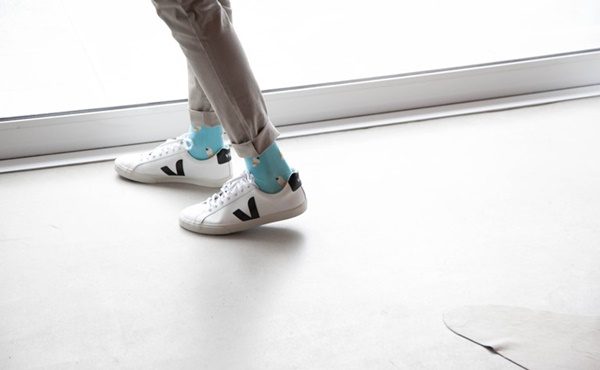When Manrags was first launched in 2016 it was born from the demand for high quality ‘fun men’s socks’, says co-founder Tina Elias.
“There were plenty of brands out there at the time, however, the quality was sub-par. We knew we could bring a high quality product to the market. But at the time [my husband] Michael’s words were ‘only as a subscription’. I clearly remember my response of ‘that’s stupid’,” she laughs.
“Little did I know at the time that it was our subscription offering that would take our brand international. Our purpose at the time was to provide stand-out essentials to men all over the globe… and we did just that.”
Indeed within six months, Manrags had more than 1,000 subscribers. Two years later it had over 7,000 and the platform saw revenues increasing 100 per cent year-on-year.

However, the pioneers of the sock and underwear subscription model in Australia became increasingly concerned about the long-term impact of textiles on our world. And so the husband and wife team decided to shift from making clothes to playing a lead role in upcycling and shaping the circular economy, through its circular fashion model.
“When we started to look at our impact on textile landfill it immediately made us turn to researching the impacts that the entire fashion industry had so far made and the figures were devastating. I have always been conscious of my footprint on the planet. Being a mother and thinking about my children’s future we knew it was time to step up and make a change for future generations to ensure they can enjoy our earth the same way we have.”
The average Aussie purchases 27kg of textiles each year and disposes of 23 kg each year. This means that as a country, we’re discarding over 6,000kg of textile and clothing waste every 10 minutes. Did you know that clothing waste takes up to 40 years to decompose, whilst shoes can take 1,000 years to break down? All up, the fashion industry is the second largest polluting industry in the world, contributing 1.2 billion tonnes of carbon a year.
Globally, 87 per cent of all disposed textiles are sent to landfill or incinerated; 12 per cent is mechanically recycled by cutting it or shredding it into fibre, insulation material or rags, and less than one per cent is chemically recycled back to reusable raw materials. The effects that textiles have on the planet prove that the linear economy model of take, make and dispose is completely unsustainable.

Recently rebranding from Manrags to Upparel, Elias iterates that it’s about the brand evolving into much more than just changing the company from a sock and underwear subscription model to a circular fashion model.
“Rebranding the company was a very long process so when it finally happened the feeling was euphoric. Evolving as a company with a brand name that was holding us back in many ways, it’s incredible how far we got with Manrags, but to think how further along we could be had we rebranded sooner or originally launched with a different name.
“We knew we couldn’t reverse the impacts of textile landfill and waste alone, but we could start to take accountability for our products and everyone else’s. Not only are we finding solutions for recycling, reusing and repurposing textiles, we are also thinking about the ‘end of life’ of each one of our products before it even is manufactured.”
Working with industry and consumers, the company makes upcycling easy and rewarding for everyone. As the major hub for textile upcycling in Australia, it gives textiles a new life, provides quality clothes to Australian charities and drives innovative product development.

Its philosophy is reuse where possible, then upcycle when necessary. This way the team ensures that minimal resources are being used to achieve their goals of circularity―constantly working to build a coalition of visionaries who share their passion to eradicate the textile landfill and foster a sustainable fashion industry and circular economy. To date more than one million pieces of textiles have been diverted from landfill.
“People are becoming more and more educated about the devastating effects of textile landfill. They want to make a difference but don’t know how. We are allowing them to make a measurable difference.
“We also have an incredibly engaged community who are true advocates for Upparel―one in three customers share us across their social media platforms.”
Upparel recently won the NRA Sustainability Champion of the Year 2020 award, which Elias says was very much unexpected.

“Winning a sustainability award within the first 12 months of launching our initiative is such an incredible achievement. Being recognised in this space is such an honour and we can’t wait to see what 2021 brings. We believe we have a lot to do and can continue make a great impact.
“As we grow we want to ensure that we maintain our focus on sustainability and that we continue to lead the way with greater circularity in our products. Collaboration is key to driving a greater impact and we have some very exciting upcycling partnerships and solutions in the pipeline.
“My hope for Upparel is to be the authority in textile waste solutions globally,” Elias concludes.








